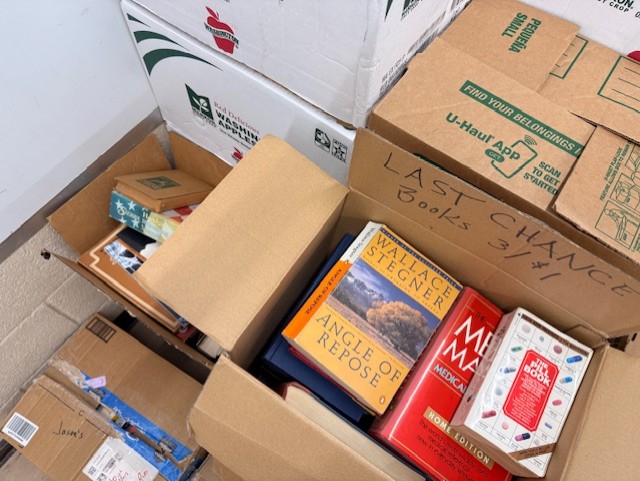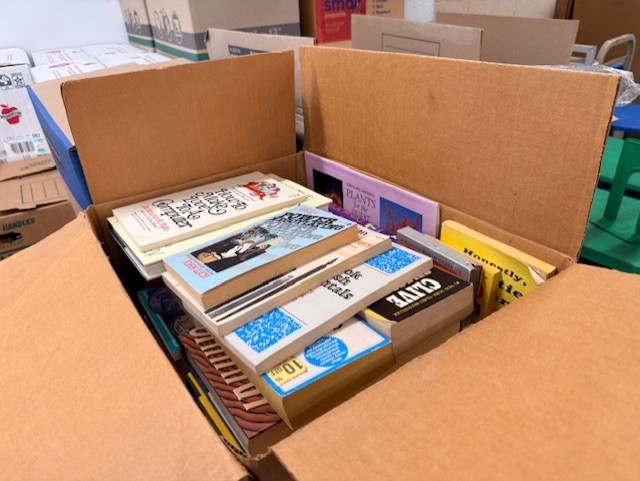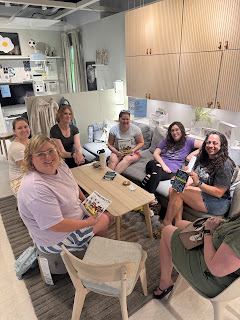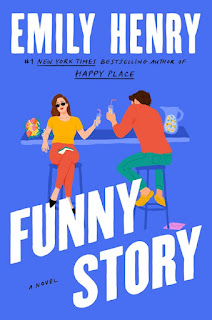Well, once again I've been slacking on these. I don't even remember some of the discussions anymore, so I'll try to keep this brief:
January 2024:
The Vanished Birds, by Simon Jimenez was Ashley's pick for January.
A
mysterious child lands in the care of a solitary woman, changing both
of their lives forever in this captivating debut of connection across
space and time.
Miriam hosted this meeting and made delicious cinnamon rolls and we all pretty much liked the book, as demonstrated in our members' reviews:
Miriam: "This is just beautiful. It's metaphorical on multiple levels. It was satisfying to
feel like I was reading the true history of the events, because the
different points of view offered their own nuanced takes of what was
happening, both in the present and the past of the story. In addition, the writing is so
beautiful and fluid that although the story is intense, this would have
been a one-sitting book for me if I had been able to carve out the
time. It was just so masterfully done."
Ashley: "I didn't finish this in time for book club
but I did finish it! And it was excellent. In the past
two months, it really hasn't stuck with me as much as I thought it
would. BUT IT WAS STILL EXCELLENT. It's sort of like if Becky Chambers's sci-fi also stabbed you with knives."
Lauren: "The Vanished Birds is an exploration of the
importance of memory and human connection, as well as a scathing
critique of capitalistic consumption and corporate exploitation. It's also smart and
readable and well-paced and engaging with well-written, complex
characters. There is one
character where I struggled with her development and choices, but I
think further reflection is necessary. The ending was perfect. I sat silently holding my book for several minutes upon finishing."
Sarah: "This was SO beautifully written and the critiques of capitalism, resource extraction, and exploitation come through powerfully without being overbearing. I felt like we get a better sense of some characters than others, and I wish there was more consistency here. The ending got a bit wild in a way that was unexpected (and a little hard to follow--I had to replay some bits of the audio a couple times--but that's likely my problem). Nonetheless, I would recommend this book!"
Average rating from our members: 4.57 stars
February 2024:
What happens when we cry--and when we don't? One
of our most private acts, weeping can forge connection. Tears may
obscure our vision, but they can also bring great clarity. And in both
literature and life, weeping often opens a door to transformation or
even resurrection.
Paige graciously hosted this meeting, which was a thoughtful and productive discussion despite some mixed feelings about this book:
Lauren: "Overall this was a good, if not perfect read.
Benjamin Perry looks at crying as an inherently human way of feeling and
considers who is allowed to cry and who isn't. Perry's
synthesis of anecdotes in each chapter is really well done. He has
clearly gathered stories thoughtfully from a wide and diverse set of
sources. I like the examination of crying thematically in each chapter.
He considers gender, race, age, and biology. This is a
little performatively woke and I was left wanting more depth from each
chapter. It reads a lot like a set of longer articles than a really
cohesive book and the chapters vary in quality. I think a more
conclusive discussion of purpose would have worked well for me. Like, if
we all cried more, what would be accomplished? What would we get out of
a world where we felt free to cry more?"
Sarah: "I had some mixed feelings about this book. One one hand, I appreciated the stories Perry collected from a diverse range of people on their experiences with crying and their feelings, and I want to honor their vulnerability in contributing to this book. On the other hand, I felt that Perry was explaining something very obvious to me, which I found tiresome. There is an audience that needs to hear this message, though, and I sincerely hope they find their way to a more liberated emotional life somehow, whether that is via this book or some other means."
Miriam: "I’m about 10% in
and I can’t stand this. It’s simply not for me. I already know the
therapeutic benefits of crying, and I feel like I’m being mansplained to
about it with this book. It’s also a little preachy."
Average rating from our members: 2.5 stars
March and April 2024: This was a double meeting for scheduling reasons. First:

The year is 1930 and Cora McCavanagh is posing
as a maid at Hollywood magnate Truman Byrd’s legendary estate. She’s
closing in on the damning evidence she needs for a high-profile client. An
aspiring PI, Cora was trained by her father, a former prison guard at
the notorious Pelican Island, where Cora grew up surrounded by hardened
criminals. Which is why she recognizes Jack Yates as soon as he
walks through the door. The last time she saw him was on an ill-fated
night that changed the course of her life and still haunts her more than
a decade later. Cora never expected to see Jack again—and now a single
misstep could cause both their secret identities to come crashing down. They
strike a tentative truce to help each other during a week of parties
overflowing with champagne and caviar. But there are puzzles hidden in
every corner of Truman Byrd’s labyrinthine estate, and if Cora is to
finally learn the truth about Jack Yates, she must unravel a sinister
history that the rich and powerful will do anything to keep concealed.
This meeting was recent enough that I remember we discussed some real historical people and events that likely inspired this book, like an art heist and the Hearst mansion. Overall impressions were favorable, though not ecstatically so:
Miriam: "The writing is
honestly pretty good - I adored the imagery and descriptions. However, I’m kinda sick of reading about 20s/30s era rich people.
Helpfully, the actual main characters of this story are not steeped in
wealth, but we get some pov chapters from a few of those who are, and I
did feel that these were not very strong povs. I questioned their
purposes in the story and thought they could have been taken out with no
negative consequences. For another thing, the mansion with all of
its secrets and codes is simply way too cool to belong to the dude it
belongs to. This is due in part to the only character I really loved,
who is an architect, and unfortunately only appears in the book a few
times. I desperately wanted it to
be Florence’s story. It would be way more interesting to read about a
Jewish lesbian breaking into the architecture field in California in the
20s and designing a kickass puzzle mansion than what we have here,
which is honestly a fairly run of the mill mystery. I may have been
in the wrong mood for this book, but it did partially win me over. The
narrative is pretty flawless, and like I said, the writing is very nice.
I liked it, but I don’t know what would have made me love it."
Sarah: "I love an eccentric puzzle house, and
the architect of said puzzle house was my favorite character. Sadly,
she's only in the book for a couple of scenes. The rest of the plot is
about uncovering dark and hidden pasts which all resolve rather
predictably. While I didn't love it, I had a decently fun time reading
this. It was a pleasant and escapist light read."
Ashley DNF'ed, and while other members were present, I don't have any other reviews to quote (and I guess I get too distracted during the discussions to put on my stenographer hat). If there's anything I missed that must be immortalized in this blog *sound off in the comments!*
Average rating from our members: 3.63 stars
Then moving on to:
Some Desperate Glory, by Emily Tesh was Sarah's pick for April.
All her life Kyr has trained for the day she can
avenge the murder of planet Earth. Raised in the bowels of Gaea Station
alongside the last scraps of humanity, she readies herself to face the
Wisdom, the all-powerful, reality-shaping weapon that gave the Majoda
their victory over humanity. Kyr is one of the best warriors of her generation, the
sword of a dead planet. But when Command assigns her brother to certain
death and relegates her to the nursery to bear sons until she dies
trying, she knows she must take humanity’s revenge into her own hands. Alongside
her brother’s brilliant but seditious friend and a lonely, captive
alien, she escapes from everything she’s ever known into a universe far
more complicated than she was taught and far more wondrous than she
could have imagined.
Ashley: "
I feel like Emily Tesh knew exactly what she
wanted to do with the story, and pulled it off. The concepts,
characters, plot twists, and everything else this book was wanting to
explore I thought it explored really well, and did so with nuance and
care*, for the most part. (*The one moment in here that
absolutely should have been removed was the scene at the end with a
certain two characters touching each other's hair/hair-equivalent, as
like a gesture of solidarity? It was genuinely one of the cringiest
things I've ever read.) I've seen some pushback to the idea that Kyr would have
been deprogrammed so quickly and easily, but I think what happened here
was right. Kyr was never going to change, unless world-altering
circumstances made her. This book wanted to explore an unthinking adherent to a fascist
death cult, what that person's life would look like to others, and what
it would take to shake them out of it. The story had me the whole time,
even when I didn't like anybody. It was an interesting way in to the
narrative, where you have to literally read between the lines at what is
not being said, or what Kyr is not noticing or understanding in order
to get a more full picture."
Kris: "This book really surprised me. It’s not my typical pick, but I’m so glad I read it. It
started slowly, but pretty soon it reeled me in. There were several
times that I thought I knew where it was going, only for the book to
shift."
Miriam: “'I need you to care about injustice.' This
is absolutely a perfect science fiction novel and the less you know
about it going in, the better (although I will add that it’s also a
master class in character development)."Sarah: "I had a great time with this book. The
action was non-stop and it was hard to put down--always a great feeling from a book. Initially I was struggling with the complete 180° Kyr goes through in a relatively short period of time, which felt like it was more for plot reasons than anywhere in the vicinity of a realistic deprogramming journey. Upon further reflection though, and conversation with someone close to me who has first-hand experience, I think I appreciate this more. Once Kyr is out of her familiar surroundings, and away from people who know her well, she no longer has to keep up appearances, or perform her persona of the 'good soldier,' allowing long-suppressed feelings and doubts to rise to the surface. I also understand that someone in her situation could easily 'glom onto' the nearest person who knows the new Kyr, which to me explains a lot about her relationship with Yiso. Overall a great read."
I agree with Ashley; the thing at the
end…so weird? Why? We didn't even get to that in our discussion, *sound off in the comments!* Overall though, impressions were quite favorable.
Average rating from our members: 4.5 stars
UP NEXT, May 2024:
Witch King, by Martha Wells (Emily Y)
Lastly,
What has the microhistory book club been up to?
Meet Me by the Fountain: An Inside History of the Mall by Alexandra Lange.

Few places have been as nostalgized, or as
maligned, as malls. Since their birth in the 1950s, they have loomed
large as temples of commerce, the agora of the suburbs. In their prime,
they proved a powerful draw for creative thinkers such as Joan Didion,
Ray Bradbury, and George Romero, who understood the mall's appeal as
both critics and consumers. Yet today, amid the aftershocks of financial
crises and a global pandemic, as well as the rise of online retail, the
dystopian husk of an abandoned shopping center has become one of our
era's defining images. Conventional wisdom holds that the mall is dead.
But what was the mall, really? And have rumors of its demise been
greatly exaggerated?
Sarah: "This book had some interesting parts. Where it
touches on the impact historically / socially / culturally of malls and
their design were the parts I most enjoyed reading. However, I would
have preferred maybe some deeper analysis. It also took me FOREVER to
read this book, and I don’t know if it was too long? (some parts felt
that way) or if it needed to be organized differently? Or was it just
me? Lastly: malls outside of the U.S. aren’t discussed until the
conclusion where we get a whirlwind global tour, which just doesn’t make
sense to me; I would have liked more of this information throughout the
book."
Ashley: "Can't really recommend this one! Unless you want
something to put you to sleep. The pictures of the old malls were cool.
I think I would have given this five stars if it was just pictures of
old malls with people in them wearing weird old clothes."
Miriam: "I listened to this on double speed because I
knew if I didn't get through it quickly, I would have a hard time
staying invested. It really would probably be better in hardcopy so that
the reader could see pictures that I assume are in there of the
different malls being discussed. I did start to become interested in
this in the latter half. It was a hard slog through the history of
seemingly every mall that was ever erected in America for awhile, but
then several things were brought up: A) RAY FRICKIN BRADBURY
kinda designed malls because he was an excellent world builder because
he was a sci fi writer, and he wrote something about it, and a mall
architect USED HIS IDEAS. That's pretty cool. B) MY 2ND COUSIN was
cited! Multiple times!! Dr.
Bernard J Frieden, who was a Ford Professor Emeritus of Urban Studies
and Planning at MIT, is my father's cousin. Anyway, it was really cool and
unexpected to hear my relative's name cited in this book. Neat! C) I
have always felt that malls aren't that bad, actually. Like, I get that
they take up a ton of space and they're full of generic "keeping up with
the Joneses" type nonsense, but they don't have to be like that. I have
often argued that local businesses should be more of a focus in malls. I
also see value in a place you don't have to pay to get into, and which
is air conditioned (or heated, if you don't happen to live in the
American Southwest), has good lighting, gathering spaces (food courts,
bench and seating areas, fountains,), and long, walkable spaces.
This book agrees with me. It brings up how a mall can be a safe place
for youths to hang after school, for unhoused individuals to get
shelter, water, and restroom use, and for people to be able to walk
safely for exercise. It also brings up what I've seen happening at two
malls near me: local businesses ARE starting to move in. While being a mall rat in the 90s was some
part of my identity as a tween and teen, I'm happy to see the direction
malls are going. I agree with this book: they're not decaying into
slummy ruins. At least, not all of them. I think we should keep them,
but make them better, and so does this author. While I had a hard time
slogging through some of this book, it ended up being more valuable to
my personal knowledge and understanding of city life than I expected."
Erin: "If you’re into urban planning, architecture, and
design this book may be for you. Evidently that’s not really my jam and
I found this dry and difficult to get through as an audiobook. I think a
physical book and pictures would have been the way to go for me. That
said, the chapter on teenagers and malls was very interesting and would
have enjoyed an entire book on this topic alone!"
Average rating from our members: 3.0 stars
"Wow, that's so interesting! What else?"

Part travelogue, part culinary history, all
capitalist critique―comedian Jamie Loftus's debut, Raw Dog , will take
you on a cross-country road trip in the summer of 2021, and reveal what
the creation, culture, and class influence of hot dogs says about
America now.
Hot dogs. Poor people created them. Rich people
found a way to charge fifteen dollars for them. They’re high culture,
they’re low culture, they’re sports food, they’re kids' food, they’re
hangover food, and they’re deeply American, despite having no basis
whatsoever in America's Indigenous traditions. You can love them, you
can hate them, but you can’t avoid the great American hot dog.
Miriam: "I desperately wanted a hotdog
while listening to this. Jamie Loftus is one of my favorite podcasters
out there, because not only is she a comedian, but she also seeks to
make people think on a deeper level about things that are not usually
analyzed. She's also very transparent in her goals for the work she puts
into the world, and I commend that. It was more of a memoir than I was expecting. I do
adore a well-written memoir, and that's partially what this is, but
interspersing it with histories of various hot dog joints made it feel a
bit jumbly. That being said, the histories of various hot dog joints
were sometimes pretty boring, so I understand the purpose of doing it
this way. What I am saying is, most of this book is quotable, I enjoyed
my time with it (but it's not a favorite), and now I want a hot dog."
Sarah: "I went in thinking this was going to just be about hot dogs, but it's also about AMERICA. And capitalism, and classism. It's weird, informative, and funny. I loved the Wienermobile chapter. 100% recommend the audio to hear this in Jamie's own voice."
I sadly missed this meeting due to travel, but while everyone went to Two Hands for corn dogs, I joined in spirit from Dog Haus in Utah:

But getting back to the book, anything else of note that was discussed? *Sound off in the comments!*
Average rating from our members: 4.6 stars
P.S. Hey, look, a Mini Cooper Wienermobile! One-of-a-kind! (It's like 4am right now--insomnia!!!--and my brain was suddenly unsure how to spell Wienermobile so then this happened.)

Next we're reading Over My Dead Body: Unearthing the Hidden History of America’s Cemeteries, by Greg Melville.
If you want to join us for this or any future micro-history books, get in touch with Jessy!
Don't forget!: If you're curious what our "sister book club" THIS BOOK CLUB SHALL NOT BE NAMED is up to, Ashley has written some great recaps over there as well!


































